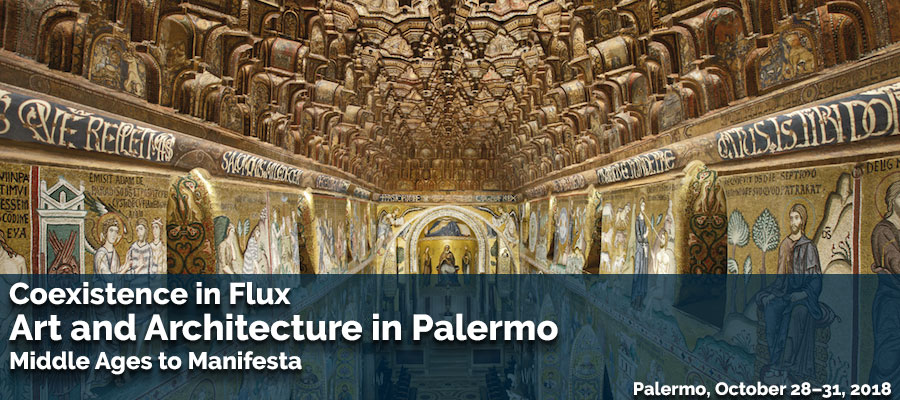Coexistence in Flux – Art and Architecture in Palermo, Middle Ages to Manifesta, Field School of the Bibliotheca Hertziana – Max Planck Institute for Art History, Palermo, October 28–31, 2018
Since its foundation, the port city of Palermo has been defined by a nomadic gaze. Thanks to its focal position in the Mediterrean, the city has experienced manifold and mixing flows of populations, from the early Greek, Latin, Jewish, Arab, Norman, Spanish and Peninsular to the more recent African, Middle Eastern and transoceanic ones propulsed by global imbalances. The motto of the city’s genius loci, ”Panormus conca aurea suos devorat alienos nutrit“ (Palermo the golden dell, devours hers and feeds the foreigners), speaks to the power of absorption that made Palermo one of the most complex cultural palimpsests of the Mediterranean.
In 2018, the city enters a new phase of reflection on its past, present, and future as the host city of Manifesta, the nomadic European Biennial of Contemporary Art. In line with the Biennial’s institutional profile, Manifesta 12 is conceived by its creative mediators as a locally implicated platform for debates on pressing contemporary issues. Under the theme “The Planetary Garden – Cultivating Coexistence,“ the exhibition intends to discuss and induce coexistence at multiple scales, from the local to the planetary, electing Palermo as its paradigmatic site.
The Bibliotheca Hertziana proposes to contribute to this reflection with its 2018 Field School, “Coexistence in Flux,” which will take place in the Sicilian capital. The Field School intends to approach ‘coexistence’ from an art historical perspective by engaging with the city’s artistic heritage as well as its current resonance in the exhibitionary field. In this process, a critical approach to the modes of thinking and acting produced within the exhibition will provide the impetus for reconsidering the city’s artistic past and present, and vice versa.
Participants are invited to focus on selected objects, monuments, architectural or landscape settings and exhibition displays ranging from the Middle Ages to the Contemporary, highlighting material evidence of the city’s cultural complexity. The aim is to identify and discuss forms, symptoms, and techniques of coexistence in relation to Palermo’s history of mobility across epochs.
Issues at stake are:
- How do the case studies stimulate reflection on cultural aggregation, and how are the notions of identity and difference ascribed in this process?
- In what ways do political, economic and social conditions inform the case studies, pressing us to rethink coexistence not only through its symbiotic, but also through its conflicting dimension?
- With Manifesta visiting Palermo, the global mobility of art practictioners becomes woven into the city’s history of migrations. How does this intersection impact the city, and to what extent does the institution reflect on its own entanglement?
Participants will be asked to give 25-minute presentations in situ on their chosen object of study based on a written contribution to a reader. Possible case studies may include:
- Cappella Palatina – Norman political rhetoric and transculturality
- Cloister of Monreale Cathedral – ‘varietas’ and stylistic provenances
- Galleria Regionale Palazzo Abatellis – Catalan Gothic and modern ‘promenade architecturale’
- Oratorio del Rosario di San Domenico – connective mediality and materiality
- Palazzina Cinese – codified exoticism around 1800
- Botanical Garden – (un)earthing the foreign and the indigenous
- Palermo’s 1891-2 National Exhibition – narratives of nationality and otherness
- Ecomuseo Urbano Mare Memoria Viva – maritime identity and participative museography
- Biennials – institutional nomadism and cultural topographies
- Manifesta 12 – exhibited art and conditions of exhibiting
The Field School is aimed at advanced undergraduate/Master’s students, Ph.D. candidates and recent postdocs in art history and related disciplines. Contributions pertaining to urban studies, Mediterranean studies, human geography or curatorial studies are welcome. The course will be held in English; some knowledge of Italian is required. The Bibliotheca Hertziana will offer lodging in Palermo and reimburse half of the incurred travelling expenses. In addition, participants will receive a daily allowance.
